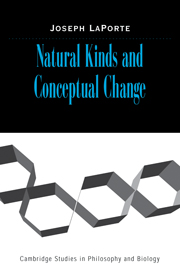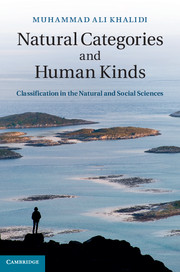Natural Kinds and Conceptual Change
According to the received tradition, the language used to refer to natural kinds in scientific discourse remains stable even as theories about these kinds are refined. Hence, scientists discover, rather than stipulate, that sentences like 'Whales are mammals, not fish' are true. In this illuminating book, Joseph LaPorte argues that scientists do not discover that sentences about natural kinds, like 'Whales are mammals, not fish', are true rather than false. Instead, scientists find that these sentences were vague in the language of earlier speakers, and they refine the meanings of the relevant natural-kind terms to make sentences true. Hence, scientists change the meanings of these terms. This conclusion prompts LaPorte to examine the consequences of this change in meaning for the issue of incommensurability and for the progress of science.
Reviews & endorsements
"...an ambitious and wide-ranging book. I wholeheartedly recommend this book to all serious students of philosophy of biology, philosophy of science, and metaphysics. ...extremely stimulating." Metapsychology Online Book Reviews
"Natural Kinds and Conceptual Change is a refreshingly direct book that challenges a range of orthodox views in the philosophy of sciences (especially biology), the philosophy of language, and metaphysics. I recommend Natural Kinds and Conceptual Change to philosophers in each of fields that it addresses." Philosophy in Review
"LaPorte's style is clear and concise, his arguments challenging and generally convincing. I warmly recommend this book to anyone interested in the philosophy of science, biology, and language."
Jochen Faseler, The Review of Metaphysics
Product details
December 2003Hardback
9780521825993
232 pages
236 × 161 × 21 mm
0.51kg
7 b/w illus.
Available
Table of Contents
- Preface
- Introduction
- 1. What is a natural kind and do biological taxa qualify?
- 2. Natural kinds, rigidity and essence
- 3. Biological kind term reference and the discovery of essence
- 4. Chemical kind term reference and the discovery of essence
- 5. Linguistic change and incommensurability
- 6. Meaning change, theory change and analyticity
- Notes
- References
- Index.



